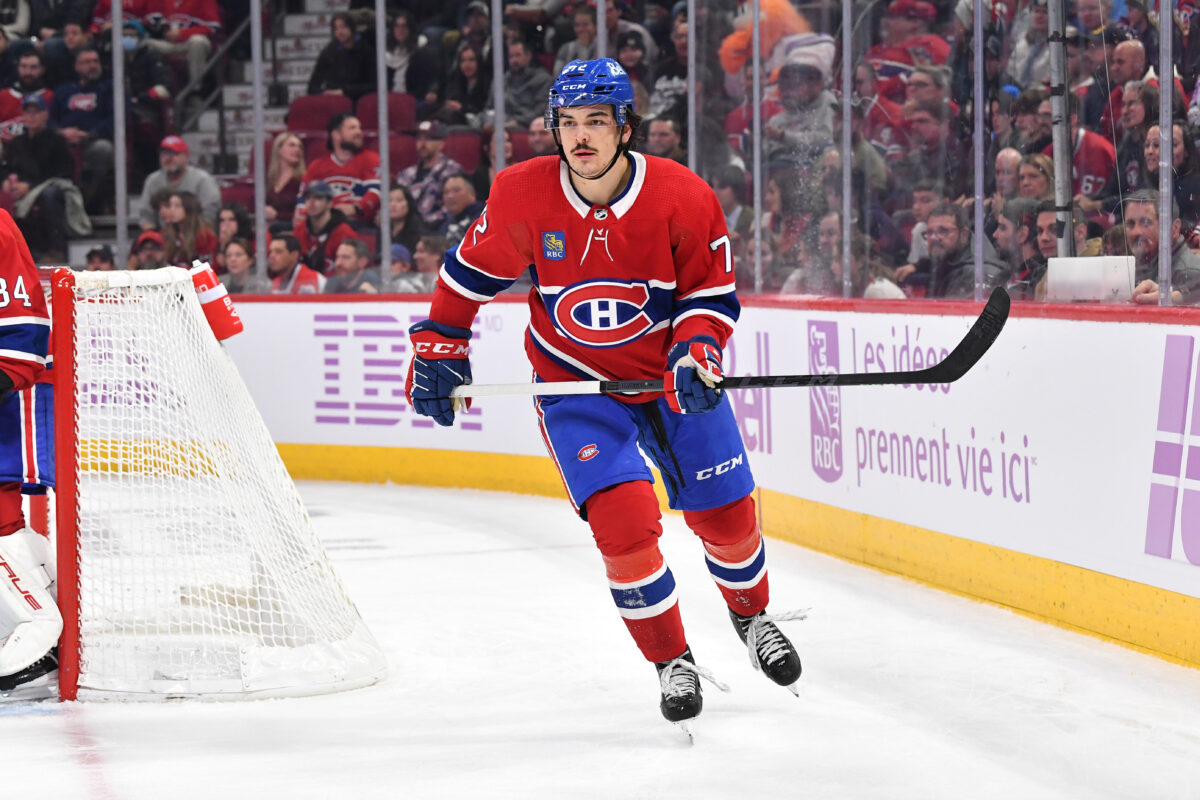This is how it was always going to play out between Arber Xhekaj and Justin Barron and the Montreal Canadiens as the restricted-free-agent defensemen negotiated their new contracts. The Habs took the logical approach, signing the pair to near-matching bridge contracts, arguably addressing their final action items for the offseason in the process.
Related: Canadiens Face Critical Negotiations with Restricted Free Agent Xhekaj
That general manager Kent Hughes signed the defensemen to such cost-effective cap hits ($1.3 million cap hit for Xhekaj, $1.15 million for Barron) only bodes well for the future of the organization, well past the two deals’ two-year terms.
There might be some pushback in that some see Xhekaj especially forming a huge part of the core for years to come. As a result, those same hypothetical critics would argue the bridge runs the risk of backfiring like it did with P.K. Subban over a decade ago. The now-retired “offenseman” held out for a big second contract, only to settle for bridge. He then won the James Norris Memorial Trophy, cashing in to an even greater extent as a result, which cost the Canadiens a great deal of cap maneuverability.
Xhekaj vs. Subban?
While there is always a risk history repeats itself, the harsh truth is Xhekaj is at little risk of becoming the next Subban. To his credit, he has made strides developing into an all-around defenseman, just not one who can create offense with as much aplomb as Subban, who had scored seven goals and 36 points in 81 games in 2011-12 before his entry-level contract expired (also playing the most of any Habs skater that season), setting in motion the unfortunate series of events that led to the bridge.

In comparison, Xhekaj is coming off a 10-point season (44 games), during which he spent an extended period of time in the American Hockey League. Even if he’s displayed some offensive potential, even if only based on the make-up of the team, it’s unlikely he continues to be deployed in such a way that he’d be able to take advantage, the balance of the deal.
To be fair, Xhekaj ranked third in power-play ice time per game among Canadiens defensemen (1:01), second among left-handed defensemen. Mike Matheson was first. With two years left on his own cost-effective deal, there’s at least a good chance the status quo holds true in at least that regard. Furthermore, with the left-handed Lane Hutson coming up eventually, it’s entirely possible he overtakes Xhekaj, who didn’t tally a single power-play point and ended up only playing a 10th-ranked 15:56 per game overall, in that role.
Xhekaj vs. Barron
Of note, between Matheson and Xhekaj, Barron placed second in terms of power-play ice time per game (1:11) in his 48 games played. The general consensus seems to be he’s the weaker of the two defensemen, which is also reflected in his lower cap hit. Nevertheless, there seems to be more of a path to longevity within the organization for Barron, at least superficially speaking. Xhekaj’s left side is fairly crowded, even excluding Matheson. Beyond David Savard, who will be an unrestricted free agent, that’s not as much the case on Barron’s right. It’s really just him, Logan Mailloux and David Reinbacher.
It would be fair to argue the Canadiens invested more in Xhekaj than Barron because they see more of a future in him. However, at the end of the day, the $15,000 difference isn’t so large that it should be a focal point for analysis. It’s just them paying market value, with Barron having further to go from a defensive standpoint to becoming a complete player.
It wouldn’t make sense to overpay him or Xhekaj, especially the latter with a degree of uncertainty surrounding his long-term outlook after two straight season-ending shoulder injuries. Ultimately neither one has established themselves as mainstays in the organization or the NHL in general. That’s just a fact.
Seeing as both deals are one-way in nature, chances are that’s going to change. That means Barron keeps his inside track to a roster spot. Keep in mind, they qualified him for a reason, when they didn’t Jesse Ylonen. They re-signed him to a one-way deal. So, in their eyes, he’ll realistically continue to get his looks both on the ice and on the power play. Granted, that doesn’t mean he’s a lock to stick around forever, but, simply by virtue of them having re-signed him, like Xhekaj, he at least has a medium-term future as a member of the Canadiens.
Barron…and Xhekaj Have a Lot of Work Ahead
You can’t look at Barron as someone who merited a bridge, because he has so much more to show, and then Xhekaj as someone who should have been extended long term, because there’s little basis in reality, assessing their capacity to be difference-makers so differently. They are admittedly two different players, with Xhekaj admittedly possessing certain physical attributes that are in shorter supply. However, until he proves he can stay healthy and consistent, he and Barron are in remarkably similar positions, with again just $15,000 per year separating them.
That’s why a long-term extension made sense for Juraj Slafkovsky and not here. Slafkovsky has a clear path to becoming a top-line fixture (if he isn’t one already). That Xhekaj probably doesn’t, with names like Kaiden Guhle and potentially Hutson above him on the depth chart, is still a positive, based on how much many fans seem him as critical to the team’s long-term success. If you’ve got a third-pairing or seventh defenseman with top-four potential, that’s a good thing. He’s still got to realize it, though.
If Xhekaj does, and he makes the Canadiens pay through their teeth? It’s not necessarily a great problem to have as the Subban experience has shown in the past… but let them cross that bridge when they come to it. For now, this one is the right course of action.
